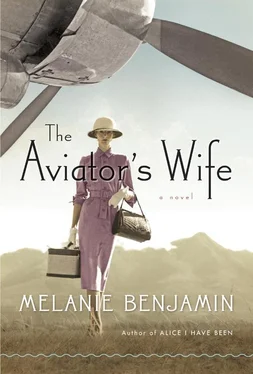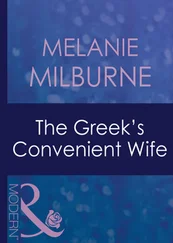“That’s nice,” the colonel said after a very small, very brisk nod, affirming the answer to the unheard question. Again, he could barely meet my gaze. His fingers began to tap even faster.
At that, my heart began to slow down. Was it true? Was the heroic Colonel Lindbergh as nervous around girls as Mother and Con said?
Apparently, he was. For as we milled about, sipping lemonade and nibbling at sandwiches brought in by an army of butlers, conversation progressed in a series of starts and stops; hesitation followed by sudden, unexpected bursts of chatter that were over before they’d had a chance fully to take off. Only once—when Daddy asked the colonel about the difference between a monoplane and a biplane—did our guest relax. With grace and confidence, he explained the differences in a long monologue that left no room for interruption; his somewhat reedy voice smoothed into a rhythm not unlike, I imagined, the purr of an airplane engine. He leaned forward, his blue eyes glistening, his fingers finally at rest, as he expounded on the differences and advantages of one set of wings (the monoplane) versus two (the biplane).
As none of us, naturally, could contribute anything to this subject, small talk resumed—tossed out easily by Elisabeth and my mother, while Daddy beamed and Dwight devoured enormous quantities of sandwiches. Con even dared to tease the colonel now and then, and he didn’t seem to mind. Meanwhile, I studied my surroundings, achingly homesick for Englewood. Nothing in this cavernous hall was familiar to me, save for the tattered American flag draped over the gilt fireplace mantel: the flag my grandfather had carried, as a drummer boy, in the Civil War. There weren’t even any framed family photographs, like there were on every surface back home. Yet I was curious about the embassy, in the way that one is curious about a museum; I promised myself I’d go exploring later, after everyone else was in bed.
“I understand you’re at Smith?” someone asked, and after a moment it dawned on me that the questioner was Colonel Lindbergh.
Surprised—I had found a corner, a good one, out of the range of any light, and had fancied myself hidden from view—I nodded. Then I realized he probably couldn’t see me, cloaked as I was in shadows. “Yes. I am.”
“Elisabeth graduated from Smith two years ago,” Mother said brightly.
“Yes, you see, Colonel, it is decreed by proclamation. All the Morrow girls go to Smith, and all the Morrow boys go to Amherst,” Elisabeth explained, and I couldn’t help but admire the dry, almost bored tone of her voice, the exact same tone she used with lesser specimens of the male species. “Where did you go to school?”
The colonel stiffened, and thrust his chin out. “The University of Wisconsin. Although I did not graduate.”
“Really?” Dwight’s voice cracked with incredulity. “You didn’t graduate? How extraordinary—what did your parents say to that? I can’t imagine what Pa here would say if I don’t graduate!”
I watched the colonel’s face as my brother nattered on. It was as if his features had settled into a mask; I had never seen a man so immobile—yet so proud. And, I suspected, so humiliated.
“Oh, Dwight! Hush!” I blurted out, surprising myself and my brother, who gave me a gravely wounded look. “How could the colonel have graduated and still learned to fly and accomplish what he’s done?”
“Yes, yes, Anne is correct. Young man, if you accomplish a tenth of what the colonel here has, I’ll be satisfied. Surprised, but satisfied,” Daddy said, as he patted the colonel heartily on the back—and gave my brother a familiar disapproving look. And I sucked in my breath and felt a pang of guilt. Poor Dwight! There would be yet another “talking to” behind the closed door of Daddy’s study, followed by the return, in full force, of my brother’s stutter.
Colonel Lindbergh didn’t reply. Instead, he looked at me in a curious, almost clinical way—until our gazes met for a confusing second that pushed me back in my corner and him back to studying the top of the piano.
Suddenly, thankfully, there were musicians setting up at the other end of the room, even more candles were lit, a fire started in the fireplace, and Mother, Father, the colonel, and Elisabeth were standing in an informal receiving line. Soon enough the room was full of people; women in fashionably short long-waisted gowns, jeweled bands about their bobbed or marcelled hair, elbow-length white gloves; men in black tie and tails, some with brilliant sashes gleaming with diplomatic medals across their chests. Several of my cousins had also traveled down, keen to see their uncle the ambassador. This grand affair had no relation to the intimate Christmas Eves of my childhood, when we would go to church, then come home and sit in Mother and Daddy’s bedroom, listening as she read from the gospel of Luke, before praying silently while the snow fell, like a benediction, outside.
Now musicians were playing snippets of Bach and, in honor of the season, Handel. I floated along the edges of the crowd, content to watch; no one really knew me, so as long as I stayed away from the receiving line, I was spared having to be introduced to all these strangers.
But none of them had eyes for anyone in the room except for our guest of honor; Colonel Lindbergh was the star on top of the Christmas tree. No, he was the Christmas tree. There was an actual fir tree stuck in a corner, lit up brilliantly, decorated all in gold—but no one paid any attention to it.
“The poor man,” Elisabeth whispered in my ear. I spun around, surprised that she had found me, half hidden as I was by a heavy gold velvet portiere. I had expected her to remain in the receiving line. “I’m sure he’s miserable.”
“He doesn’t look it,” I replied, watching the colonel. He smiled pleasantly as he grasped each hand thrust eagerly his way.
“But look. His face—it doesn’t change.”
“No, I guess it doesn’t. It’s like a mask.” It was true; his smile never varied, never deepened or diminished, and his brow remained smooth. But it was impossible not to be awed by his poise, the unflinching way he looked at the long line of people in front of him. Had it been me at whom people were staring in that way—that rather frightening, mindlessly adoring way—I would not have been so calm!
“You know,” Elisabeth continued, amused, “all the men want to be him. All those lawyers and diplomats, look at them just hanging on his every word! They all wish, secretly, that they had the same courage he does, but they all know, just as secretly, that they don’t. It’s sad, when you think of it.”
“And the women?” I asked impulsively.
“Oh, for the older women, he’s the son they never had. For the younger women, he’s the husband of their dreams!”
“It must be hard to live up to that. Why did he come here, then—surely he’s tired of all this?” I turned to Elisabeth; as she watched the colonel, a small smile played about her Kewpie doll lips. She was, I realized with a sinking sensation in my breast, interested in him, as Mother had most likely hoped—and as some of the gossip articles had hinted, when news of the colonel’s impending Mexico visit had first appeared.
I shook my head, trying to rid myself of any feelings of jealousy; of course, the colonel barely knew I existed. How could he notice me, next to my sister? Me, a dull brown pinecone amid all this tinsel and polish and gilt?
“Oh, some of Daddy’s colleagues formed a commission to promote aviation as diplomacy, and the colonel is the finest ambassador they could get. And, of course, you know Daddy met him at the White House when he first returned from Paris.”
I nodded; Calvin Coolidge was an old school chum of my father’s, and the reason why we were here in Mexico.
Читать дальше












